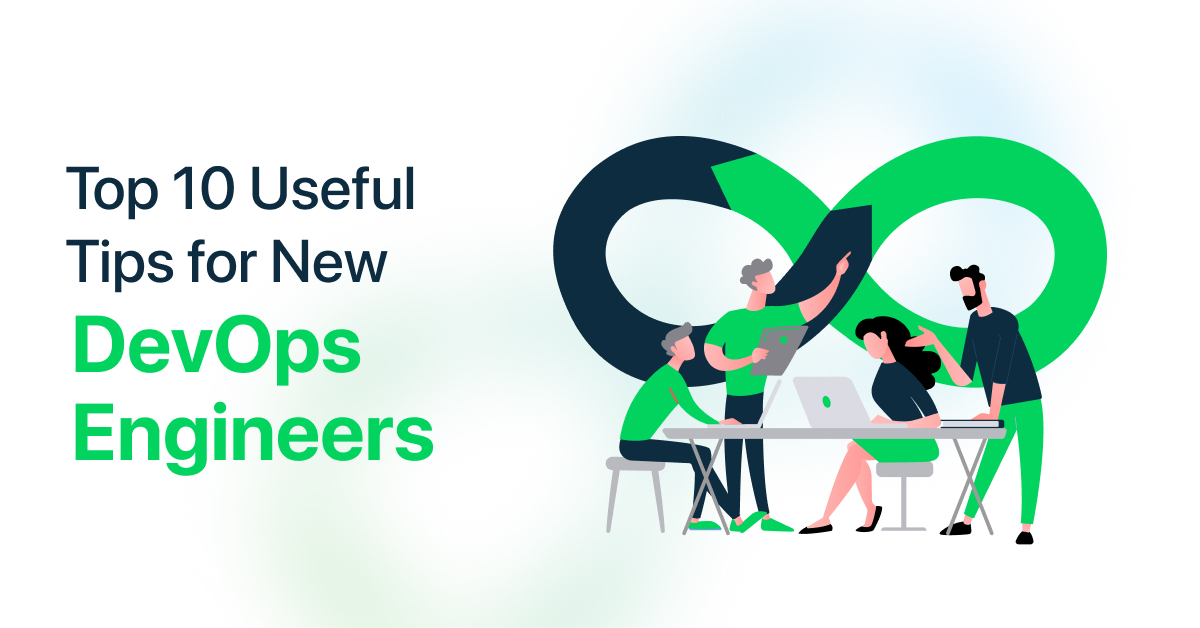Top 10 Useful Tips for New DevOps Engineers

DevOps is paving the road for better software development methods in today’s world. DevOps brings the development and operations teams to work together. It aims to close the gap between the development and operations teams, which write the code and deploy and manage the program in production. It replaces the old approach of development teams building an application and then turning it over to operations teams to run without knowing how it was produced.
Changes are made regularly, ideally many times per day, and extensive automation and testing are employed to reduce downtime and swiftly resolve issues. Many companies have used it to improve their development process by shortening the feedback loop. On the other hand, hiring DevOps engineers might be a difficult undertaking. Due to the rising need, many companies hire devops engineers, and there might be specific qualities they are looking for. Companies are eager to have the right talent on their teams to help avoid all-to-common DevOps failures. Today’s blog will learn some tips for DevOps engineers to help you in your DevOps career path. Let’s get started.
Cross-training yourself
Whether you are a developer or the operations team, it is time to move out of your comfort zone. A skill set that is not limited to their job roles must be acquired. When we talk about transitioning to DevOps engineering positions, developers by training have an advantage over operations specialists. The cross-training of skills is required not only for creating in-house tools and scripts but also because they are more likely to understand the everyday needs of developers.
Companies that hire devops engineers prefer developers or any other specialist. As the developers have a deeper understanding of the DevOps background, they are more skilled and knowledgeable about the tools used and can utilize their concepts in catering to various needs.
Effective Communication
Given the fundamental nature of DevOps, communication and collaboration are critical to success. It is essential to create harmony between development and operations teams, align team goals with business objectives, and implement DevOps culture throughout departments. To do so, effective communication is the key. DevOps requires a person with soft skills, self-motivation, flexibility, and a willingness to keep learning.
Professionals in DevOps should have good listening skills along with good implementation knowledge. They should be clear that DevOps transformation involves stakeholder discussions, awareness about business goals, assessment, and identification of improvement areas, all driven by collaboration.
Technical qualities
After you’ve mastered your fundamental technical abilities, you can move on to learning about the tools and processes utilized in DevOps positions. This is by no means a full list, but these are the most commonly encountered skills and subjects in most DevOps roles.
Understanding of Relevant Tools
DevOps depends on the toolset it involves during different phases of development. Good tools can make or break the project. DevOps has brought in numerous tools. However, the relevance of DevOps success should be examined in depth. DevOps tools help companies overcome some of the challenges of implementing DevOps principles. There is no such thing as one solution for all, though. As a result, there is a wide selection of DevOps tools to suit every requirement. And here, the tips for DevOps engineers would be to gain knowledge of DevOps tools.
Planning & Administration
Planning is important before starting any new project. DevOps engineers are expected to be familiar with the latest technologies and methodologies for deploying apps. They should also be familiar with cloud systems such as Amazon Web Services, Microsoft Azure, and Google Compute Engine (GCE). Hence, planning and administration should be one of your strategies.
Automation
It is beneficial to study automation and gain a deeper understanding to know what you are automating. You’ll be able to execute Agile processes more efficiently if you’re familiar with popular software automation technologies. More importantly, by keeping an up-to-date automated infrastructure, you will be able to communicate effectively with your company’s system administration staff.
Agile Development Skills
Agile enables DevOps engineering teams to quickly identify and deploy new features without sacrificing quality or the end-user experience. This important technique will really up your game to work with an organization’s software development team and ensures that you can efficiently apply it. Software organizations hire DevOps engineers to assist them in transforming agile approaches into company-wide best practices for producing new products and updating old ones, which makes it an important skill.
Learn Cloud Technologies
AWS, Azure, Google Compute Engine (GCE), and other cloud platforms are important. DevOps engineers who specialize in cloud technology are given preferences. They should understand how to use the many services accessible on these platforms and how to connect them.
Continuous Delivery
Continuous delivery helps you improve collaboration between your organization’s infrastructure and software development teams. This skill will help you to be able to be a part of your team. Furthermore, understanding this skill set will enable you to reduce the number of issues that make it into production, minimizing the time it takes to deploy updates.
Continuous Integration
This is one of the most important tips for a DevOps Engineer to succeed. You’ll be able to produce products in shorter time frames without losing quality or end-user experience if you can quickly automate build processes and deploy software upgrades.
Conclusion
DevOps engineer hiring is a crucial process. Remember to be creative and flexible and with an attitude to always keep learning new technologies. With these tips, one can higher their chances of getting hired.











